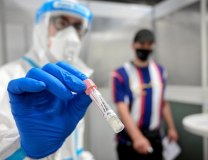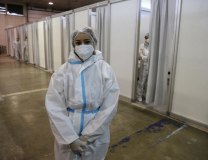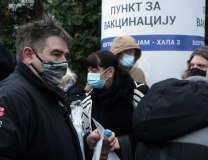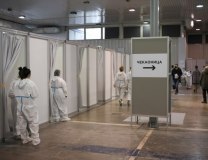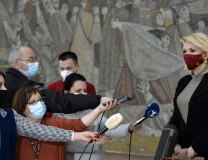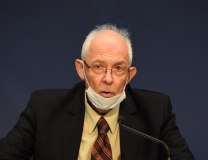Head of the WHO Office: Impressive
Head of the Office of the World Health Organization in Serbia, Marjan Ivanuša, says the results Serbia achieved in the fight against coronavirus are impressive.
Source: Tanjug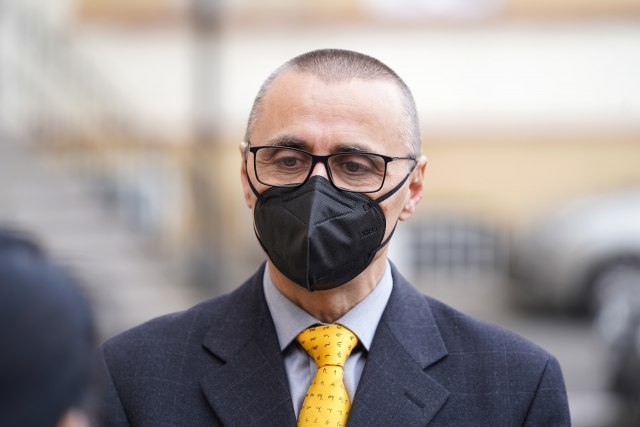
He said that he hoped that some quantities of the vaccine, through the COVAX program, would arrive in Serbia soon.
Ivanusa told RTS that the WHO is helping the authorities in Serbia and emphasized that vaccination is a safe way to achieve collective immunity and stop the epidemic.
However, he pointed out that we are just at the beginning, but that the results of Serbia are impressive and that he hopes that it will continue like this.
He added that he was not worried about Serbia and its readiness to carry out vaccination, but about the situation at the global level because there are not enough vaccines.
Ivanuša emphasized that the COVAX initiative envisages that around 150 million doses of vaccines will be delivered to countries in the world in the first quarter. As he stated, the first doses should arrive in February, and then in March, and an additional 500 million doses are expected from April to June.
In the second half of the year, as he added, even more is expected.
Ivanuša said that he hopes that some quantities of the vaccine will soon arrive in Serbia through the COVAX program, because the interest in vaccines in the world is great.
Commenting on the announcements about the introduction of COVID passports, he emphasized that the WHO is against that for several reasons.
First, he stated that the position of the WHO is that the vaccine is primarily intended for those who really need it, for health reasons, and not for tourists. He also pointed out that the vaccine is not available to everyone, and that it is known that it prevents a serious course of the disease and mortality, but that its impact on the spread of the pandemic is yet to be seen.
Ivanuša said that a vaccination certificate is needed so that a person knows when the revaccination deadline is and that it should be part of the medical documentation, and not a travel document.
The director of the Batut Institute, Verica Jovanović, said that tomorrow's session of the Crisis Staff would analyze the epidemiological situation in the country, by districts and regions, as well as the declining trend of new cases of infection, but also the capacities in hospitals.
Asked if there could be an audience at the match between Red Star and Milan on February 18, Jovanovic said that "we will not be able to be imprisoned for life."
She added that the control of all measures that are in effect is of great importance, estimating that there is still time until February 18.
However, Jovanović emphasized that the risks are still present and that it is not known how the further course of the epidemic will go. She also confirmed that more than 400.000 citizens of Serbia have been vaccinated so far, and said that vaccination, with respect to measures, is the only way to achieve collective immunity and stop the epidemic. As she stated, the interest of citizens in vaccination is great, and first of all, the population groups with the highest risk are vaccinated.
The director of the Government Office for eUprava, Mihajlo Jovanović, said that more than 780.000 citizens applied for vaccination through the eUprava portal or call center.
Jovanovic pointed out that, when it comes to target groups, half of the applicants are older than 75 and groups from 65 to 74.
He also pointed out that the interest of citizens in a certain type of vaccines was changing as the vaccines arrived in Serbia.
Deputy director of KC Nis, Radmilo Janković, said that the vaccination in that institution started on January 5, and that 1.100 health workers have been vaccinated to date. He pointed out that there are still those who are waiting for the "Sputnik V" vaccine.
Janković emphasized that a few days ago, at the meeting of the directors of the COVID hospitals with the Minister of Health, the conclusion was that the hospitals should return to normal as soon as possible, in order to treat other patients, especially those waiting for surgical interventions.
When asked about the new strains of the virus, he assessed that they were expected and that it is important that the vaccines are evenly distributed on a global level.
Jankovic warned that it is not good for hotspots to appear in third world countries, because that enables mutated strains to develop there, which could later merge into Europe again.
He reiterated that it is important for immunization to be as comprehensive as possible, without forgetting third world countries in the process.




